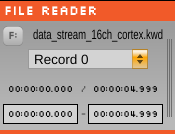File Reader
IMPORTANT: The Open Ephys GUI documentation has migrated to a new site – please visit https://open-ephys.github.io for the most up-to-date information.
Function
The File Reader reads data from a local file. It is currently only compatible with files saved in the KWIK format (specifically KWD files storing continuous samples), which can either be saved directly from the Open Ephys GUI or from another program. There are four example files included in the GUI repository that can be used with the FileReader, found in the Resource/DataFiles directory (source code download) or the DataFiles directory (executable download):
- data_stream_16ch_cortex.kwd - data from 8 stereotrodes (16 channels total) recorded from barrel cortex of an awake mouse. The signals contain a bunch of single units, and can be used to test out the Spike Detector
- data_stream_16ch_hippocampus.kwd - one channel of data recorded from CA1, copied across 16 channels. The signals have large-amplitude theta oscillations, and can be used to test out the Phase Detector.
- data_stream_sine_wave.kwd - 16 channels of a simple, 1000-microvolt sine wave. There's a small glitch near the end.
- chirps_16_channels_At40kHz.kwd - 16 channels of frequency sweeps at 40 kHz
Acquisition won't start until the File Reader knows where it's data is coming from. Make sure you select a file before hitting the "play" button.
If there are multiple recorded segments within the file (i.e., recording was stopped and restarted), you can choose which segment you want to play back using the drop-down menu.
You can also choose a subset of your recorded file by changing the "start" and "end" times at the bottom of the File Reader editor.
Parameters saved
Path to the file providing the input.
Upgrades needed
It would be nice to display more information about the file that's been selected, such as channel count and sample rate, within the editor.
The File Reader cannot currently read in events, but they can be simulated by uncommenting the code at the end of the FileReader::process() method.

